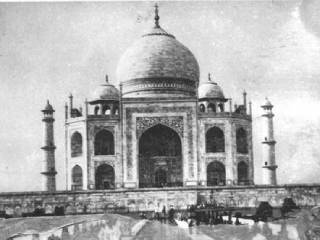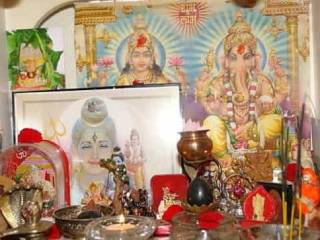Magh Shuddha Trayodashi, Kaliyug Varsha 5111
The six years of UPA rule have been a period of minority assertion. During this period, the Government of India has assiduously sought to promote the idea that Christian and Muslim minorities have special rights and claims on Indian polity, which this government is committed to honour. The Prime Minister of India himself has gone on record to state that the minorities have the first right on the resources of this country, and there have been statements from high governmental and political authorities expressing the same intent.
These statements of intentions have been backed by institutional and budgetary actions in favour of the minorities. A separate Ministry of Minority Affairs has been created to specifically concern itself with the rights and privileges of the minorities. And, a number of commissions and committees have been set up to report on the condition of minorities, and to suggest constitutional, legal, administrative and fiscal arrangements to give effect to their special privileges and rights.
"The High Level Committee on Social, Economic and Educational Status of Muslim Community in India" set up in 2005 under the chairmanship of Justice Rajinder Sachar by the Prime Minister, commonly known as the Sachar Committee, was perhaps the most high powered of such bodies. It made a comprehensive survey of the status of Muslims in almost all fields of Indian economy, polity and society. The data collected by the Committee did not show the Muslims to be particularly badly off in any field. On the other hand, the data indicated a resurgent Muslim community that was growing fast not only in numbers, but also in its educational, economic and social status. The Committee, in any case, went on to give wide-ranging recommendations for institutional and economic arrangements to be made in favour of the Muslim community. The Committee, in particular, recommended special treatment for Muslims in all government schemes. It even recommended special consideration for Muslims in the matter of disbursement of bank loans.
Even before the Committee gave its report, the government had launched a "New 15-Point Programme for the Welfare of the Minorities"; this was a comprehensive programme for providing special privileges and rights to the minorities in various walks of Indian polity and economy, for creating and strengthening special institutional structures and providing budgetary support for this purpose. The recommendations of the Sachar Committee were then used for further empowering these institutional structures and launching new programmes and initiatives in favour of the minorities in general, and the Muslim minority in particular.
The Sachar Committee, however, stopped short of recommending reservations for Muslims in government jobs or in educational institutions. The Report of the National Commission for Religious and Linguistic Minorities, which has been recently released, has now addressed that lacuna. This commission was set up in the Ministry of Minority Affairs as early as October 2004 under the Chairmanship of Justice Ranganath Misra. Dr. Tahir Mahmood, Dr. Anil Wilson and Dr. Mohinder Singh were the other three Members. The Commission submitted its report in May 2007, but it was made public only during the last session of the Parliament.
In its report, the Commission has ventured where Justice Sachar had hesitated to step. It has recommended an across the board 15 per cent reservation for minorities in all government jobs and educational institutions. Within this minority quota, the Commission has fixed a sub-quota of 10 per cent for the Muslims and the remaining 5 per cent for other minorities. In an extraordinary recommendation, the Commission has specified that in case the quota for Muslims cannot be filled for lack of appropriate candidates, it shall be offered to candidates from other minorities, "but in no case shall any seat within the recommended 15 per cent shall go the majority community". The Commission has further clarified that this 15 per cent quota shall be in addition to what the minority candidates secure on their own merit in open competition.
The recommendations, if implemented, shall ensure that minorities have a presence of more than 15 per cent in all walks of Indian public life. According to the Commission’s own assessment, the educational and economic status of all minorities excepting the Muslims is considerably better than the majority. They are therefore likely to get a substantial share in government jobs and educational institutions on their own merit, as they do even now. The total share of minority communities shall therefore turn out to be considerably more than 15 per cent. From the way the recommendations are formulated, the intention of the Commission seems to be to ensure that the religious minorities as a whole have a larger say and share than their numbers alone would allow.
The tone and tenor of the reports of both the Sachar Committee and the Misra Commission are not merely to provide special privileges and rights to the minorities, but also to disprivilege the majority. Both reports revel in casting unfounded aspersions and making snide remarks against the majority community. Sachar Committee, in fact, suggests that it does not really matter whether Muslims or some other community come to form the majority in India. Misra Commission wants to now ensure that until the minorities do not become the majority, they should enjoy a major share in the polity.
Incidentally, the proposal of 15 percent reservation in favour of religious minorities seems odd in the context of the arguments that the Ranganath Misra Commission has developed throughout the report. The thrust of their argument is that reservations on the basis of religious or caste identity are not justifiable. India should instead have family-based reservations, and the families qualifying for such reservations should be identified on the basis of thorough detailed surveys based on well defined economic and educational criteria. However, while formulating its recommendations, the Commission suddenly terms this as the ultimate goal, and meanwhile recommends the 15 per cent reservation for religious minorities. This makes the recommendations almost sound like a command performance.
The Commission has made another recommendation which, if accepted, has the potential of drastically changing the religious complexion of India. Giving its recommendations on an additional reference made by the government, the Commission has recommended that the Presidential Order of 1950, which excludes Muslims and Christians from the category of Scheduled Castes, should be amended to de-link the Scheduled Caste status from religion. The argument in this case is that the Constitution "prohibits any discrimination on the ground of religion". It is strange that a high judicial person can make one set of recommendations on the basis of religion, and almost the next paragraph invoke the principle on non-discrimination on the basis of religion.
The effect of these contradictory recommendations is that those of the Scheduled Caste persons who choose to convert to a minority religion shall now be doubly privileged, first as members of minority religions for which the Commission has recommended 15 per cent quota, and then as members of the scheduled castes, for whom special constitutional protection and quotas are available. An immediate consequence of the acceptance of this recommendation would probably be to allow the so-called crypto-Christians to formally declare themselves as Christians and thus raise the proportion of Christians from the present 2.5 to perhaps around 6.5 per cent.
Fortunately, the Member-Secretary of the Commission, Mrs. Asha Das, has not consented to this particular recommendation and has appended a dissenting note. The note, among other things, insists that there is a difference between religions of Indian origin, and religions like Islam and Christianity that have originated outside. And, therefore, the privileges offered to Hindu, Sikh, Jain and Buddhist Scheduled Caste persons cannot be extended to Muslims and Christians. It must be seen as an unintended benefit of Ranganath Misra Commission Report that the question of religions of Indian and non-Indian origin has been now mentioned in an official document. It is also fortunate that the National Commission on Scheduled Castes, headed by Buta Singh, formally opposed the recommendation of the Ranganath Misra Commission to allow members of the Christian and Muslim communities to claim scheduled caste status.
It seems these detailed reports of various commissions and committees do bring into the open some important facets of the situation of minorities. The enormous data collected by the Sachar committee brought into focus the great strides the Muslim community has made in terms of sheer numbers, and in terms of educational and economic attainments during the last two or three decades. Before the Sachar Committee Report how many of us knew that female literacy amongst Muslims is higher than Hindus in more than half of the Indian states? And, that the Muslims are also economically much better of than Hindus in those states. Ranganath Misra Commission Report has brought into the open the question of difference between religions of Indian and non-Indian origin. The report has underlined the fact that even high government authorities cannot agree on this issue. Let us carry forward the debates opened up by Justices Sachar and Misra.
Source: Organiser



 Mizoram: EC accepts Christians’ demand to defer counting on Sunday, but what if Hindus had made a similar demand?
Mizoram: EC accepts Christians’ demand to defer counting on Sunday, but what if Hindus had made a similar demand? Sign Petition : Immediately repeal the draconian and unconstitutional ‘The Waqf Act, 1995’
Sign Petition : Immediately repeal the draconian and unconstitutional ‘The Waqf Act, 1995’ Shriram : Sri Lanka’s saviour
Shriram : Sri Lanka’s saviour Why it is so cool to malign Hindu gods and goddesses, but it may not be that easy now
Why it is so cool to malign Hindu gods and goddesses, but it may not be that easy now Shocking Truth of Taj Mahal exposed by Late Pujya P. N. Oak
Shocking Truth of Taj Mahal exposed by Late Pujya P. N. Oak How are Hindus treated in states where they are in a minority?
How are Hindus treated in states where they are in a minority?